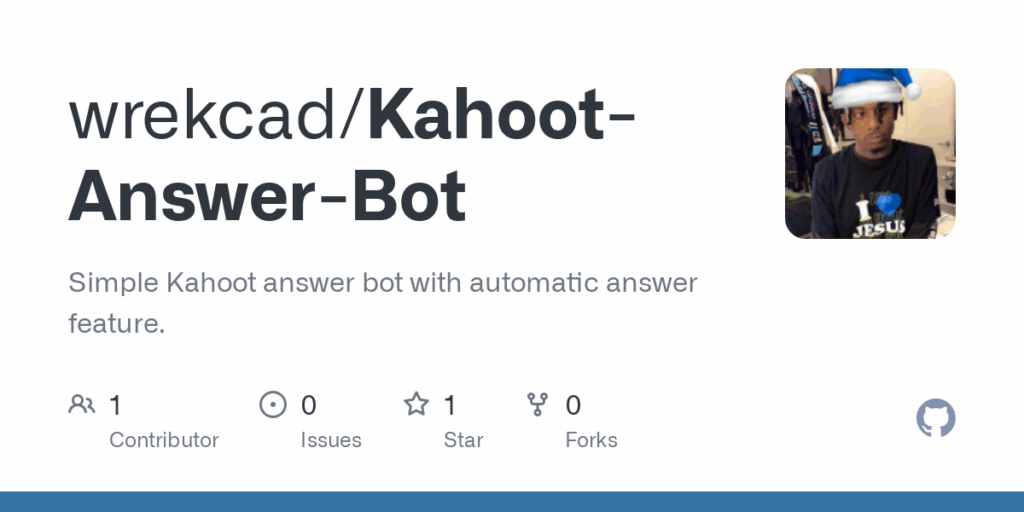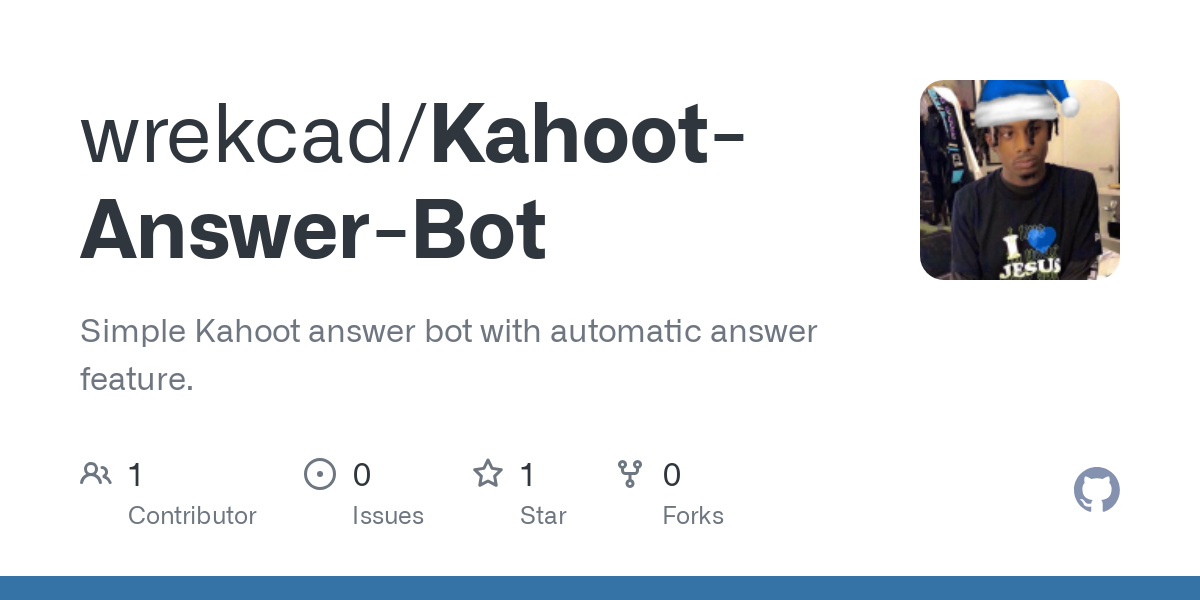
Kahoot Answer Bots: Understanding the Risks and Ethical Implications
Kahoot! has become a ubiquitous platform for interactive learning and engagement, especially in educational settings. However, the rise of Kahoot answer bots presents a growing concern. These bots, designed to automatically answer questions in Kahoot! games, undermine the integrity of the learning process and raise ethical questions about fair play and academic honesty. This article delves into the mechanics of Kahoot answer bots, explores their potential impact, and discusses the measures being taken to combat their use.
What are Kahoot Answer Bots?
Kahoot answer bots are automated programs or scripts created to participate in Kahoot! quizzes. They function by analyzing the game data in real-time and selecting the correct answers, often with inhuman speed and accuracy. These bots are typically deployed to disrupt the game, inflate scores, or simply to prank other players. Understanding how these bots operate is crucial to mitigating their impact.
How Kahoot Answer Bots Work
The functionality of a Kahoot answer bot can be broken down into several key steps:
- Game Entry: The bot joins a Kahoot! game using a generated or provided nickname.
- Data Interception: The bot intercepts the data stream between the Kahoot! server and the player’s device. This data contains information about the questions, answer options, and timing.
- Answer Analysis: The bot analyzes the intercepted data to identify the correct answer. This can be done through various methods, such as pattern recognition, keyword analysis, or direct access to the answer key (if available).
- Automated Response: The bot automatically selects the correct answer with minimal delay, often faster than a human player could react.
Some sophisticated Kahoot answer bots can even simulate human-like response times to avoid detection. They might also incorporate features to answer randomly or make occasional mistakes to appear more legitimate.
The Impact of Kahoot Answer Bots
The use of Kahoot answer bots can have several negative consequences, particularly in educational settings:
- Compromised Learning: By providing automated answers, bots prevent genuine engagement with the material, hindering the learning process. Students who rely on bots miss the opportunity to understand and retain information.
- Unfair Competition: Bots create an uneven playing field, giving an unfair advantage to those who use them. This can be demoralizing for students who are genuinely trying to learn and compete fairly.
- Distorted Assessment: Kahoot! is often used as a formative assessment tool. The presence of bots can skew the results, making it difficult for educators to accurately gauge student understanding.
- Disrupted Game Experience: The rapid and accurate answers provided by bots can disrupt the flow of the game and diminish the enjoyment for other players.
- Erosion of Trust: The use of bots can erode trust among students and between students and educators. It raises questions about academic integrity and the value of honest effort.
Ethical Considerations
Beyond the practical consequences, the use of Kahoot answer bots raises significant ethical concerns. Cheating in any form, including the use of bots, is a violation of academic integrity and undermines the principles of fair play and honesty. It teaches students that it is acceptable to gain an advantage through dishonest means, which can have long-term implications for their character and ethical decision-making. Using a Kahoot answer bot is simply unethical.
The Argument Against Using Bots
The core argument against using Kahoot answer bots centers on the principle of fairness. Everyone should have an equal opportunity to succeed based on their knowledge and effort. Bots undermine this principle by providing an artificial advantage to some players. Furthermore, the use of bots devalues the efforts of those who are genuinely trying to learn and improve. It sends the message that cheating is acceptable as long as you don’t get caught.
Combating Kahoot Answer Bots
Kahoot! and educators are actively working to combat the use of Kahoot answer bots through various measures:
- Bot Detection Algorithms: Kahoot! employs sophisticated algorithms to detect and identify bot activity. These algorithms analyze response patterns, speed, and other indicators to flag suspicious accounts.
- CAPTCHA Challenges: CAPTCHA challenges are used to verify that players are human and not automated bots. These challenges require users to solve a simple puzzle or identify distorted text.
- Account Verification: Requiring users to verify their accounts through email or phone number can help to reduce the number of bot accounts.
- Educating Students: Educating students about the ethical implications of using bots and the importance of academic integrity is crucial. This can help to deter students from using bots in the first place.
- Monitoring Game Activity: Educators can monitor game activity for suspicious behavior, such as unusually fast response times or consistently high scores.
- Reporting Mechanisms: Providing a mechanism for users to report suspected bot activity can help to identify and address the problem.
These measures are constantly evolving as bot developers find new ways to circumvent detection. It is an ongoing arms race between those who create bots and those who are trying to prevent their use.
Alternatives to Kahoot Answer Bots
Instead of resorting to Kahoot answer bots, students can explore alternative strategies to improve their performance in Kahoot! games:
- Studying and Preparation: The most effective way to improve your score is to study the material and prepare for the quiz. This will give you a solid understanding of the concepts and make it easier to answer questions correctly.
- Active Participation: Engage actively in class discussions and ask questions to clarify any concepts you don’t understand.
- Practice Quizzes: Take practice quizzes to familiarize yourself with the format and types of questions that are likely to be asked.
- Collaboration: Work with classmates to review the material and quiz each other.
- Time Management: Practice answering questions quickly and efficiently to improve your response time.
The Future of Interactive Learning and Bots
As technology continues to evolve, the challenge of combating bots in interactive learning platforms will likely persist. It is essential for educators, platform developers, and students to work together to create a learning environment that is fair, engaging, and conducive to genuine learning. This requires a multi-faceted approach that includes technological safeguards, ethical education, and a commitment to academic integrity. The presence of a Kahoot answer bot is a challenge to academic integrity.
The key is to foster a culture where learning is valued for its own sake, rather than simply as a means to an end. When students are genuinely engaged and motivated to learn, they are less likely to resort to cheating or using bots. Furthermore, educators can design learning activities that are more engaging and less susceptible to bot interference. For example, incorporating open-ended questions, collaborative projects, and real-world applications can make it more difficult for bots to provide meaningful answers.
In conclusion, while Kahoot answer bots pose a threat to the integrity of interactive learning platforms, they also present an opportunity to re-evaluate our approach to education and assessment. By focusing on genuine learning, promoting ethical behavior, and implementing effective safeguards, we can create a more equitable and engaging learning environment for all students. The ethical use of technology in education is paramount, and combating the use of Kahoot answer bots is a step in the right direction. [See also: Online Cheating Detection Methods] [See also: Ethical Considerations in Education]

